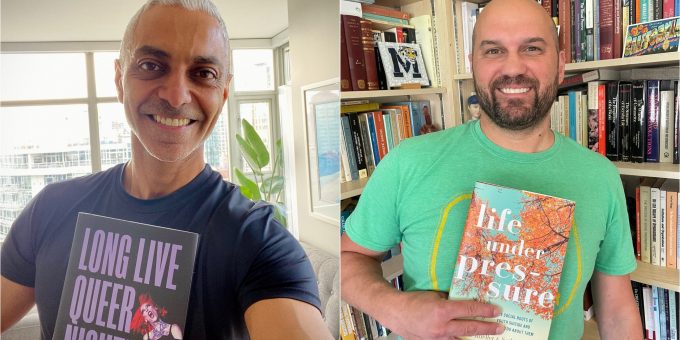
letter from the editors: spring 2024
Reaching broader publics? Yeah, we do that.
Amin is in Amsterdam and London on a European book tour for Long Live Queer Nightlife. He is racking up reviews on both sides of the pond, including in The New York Times. Meanwhile, Malcolm Gladwell endorsed Seth’s new book (co-authored with Anna Mueller) about youth suicide clusters, Life Under Pressure. The trio are hosting an event at the 92nd Street Y in New York, a world-class community center where people can connect through the arts, culture, and conversation.
We preach and practice the mission of public engagement that motivates our magazine, much like the authors of our blooming Spring edition. To get us started, consider how universities appear through a culture-war lens as bastions of liberalism. Yet there is considerable value-add of conservative viewpoints in public debates. “Look,” Charles Fain Lehman from the Manhattan Institute says bluntly, “about half the country is conservative. You can think that they are wrong, but if you want to have an impact on those people, it is helpful to at least have some vague idea of what they think.” Our Q&A with Lehman creates a needed space for balanced perspectives, or “epistemic humility,” as he calls it. You don’t have “to agree” with Lehman, he freely says, but we should be willing “to listen” to other points of view. After all, we all have “something valuable to say.”
The features in this fertile issue have significant insights to offer about who we are and how we cultivate our identities, particularly amidst the mayhem of the modern world. Listen closely, and you’ll learn about the label preferences of people who have experienced sexual violence: Do they define themselves as survivors, victims, or something else? From there, florets of wisdom await about the family-making practices of interracial couples: How do they manage racial surveillance and threats of erasure? Next come the sprouting conspiracy theories: Why are some of us irresistibly drawn to groups like QAnon, and how do those conspiratorial beliefs feed deeper needs like validation, connection, and purpose? The final feature is rooted in philosophical and applied questions about data transparency: If the public sphere is a democratic one, what does it mean for Twitter/X to cut off free access to its data?At Contexts, we believe that there are many ways of fruitfully engaging with the public. The mighty pen might be most familiar, but we also like photographs that emphasize the artful qualities of sociology. We are pleased to present two compositions that use images to tell a story. The first grapples with overdose fatalities in Massachusetts. Susan Sontag was right to write, “Memory is, achingly, the only relation we have with the dead.” More than just a requiem for those who have lost a beloved to a fatal overdose, memory is also the catalyst for action to raise international awareness about harm reduction.
From Massachusetts we travel to Puerto Nuevo, the second deadliest district in Peru, where a project was redirected by children who thought about identity in different ways than the researchers. While the team wanted photographs about growing up in violent circumstances, the kids resisted. “Can we go somewhere else to take pictures?” Others would say, “I don’t want to take pictures of what I do not like.” By creating an opportunity for kids to show their neighborhood on their own terms, through their own eyes, they shifted the conversation from the constraints of poverty and crime to the abundance of talent, fashion, and community. This is participatory public sociology at its best.
After these visually beautiful essays come provocations about the use of drag performance by trans and nonbinary individuals to find and affirm gender identities, how survivors are depicted in horror movies, overlooked facts about abortion bans, and some “tricks” that U.S. Supreme Court justices have used to overturn affirmative action.
Spring brings more light into the world, and we, wide-eyed with wonder, bring you one illuminating idea after another. To round out the issue, we invite you to a conversation about queer spaces and placemaking practices as inspired by the publication of two new buzzy books (confession: one is written by one of us!).
Anchoring the spring issue is a deeply personal essay by Aldon Morris, past president of the American Sociological Association. Morris offers a future-forward, clarion call to action: without struggle, there is no progress. Power concedes nothing without a demand, Morris reminds: “It never did, and it never will.”
As you read these essays, we hope that you will be inspired to listen closely, speak your truth unabashedly, and let the sun shine on the terrace of our shared social life. The public needs us, needs you. Together, let us commit to the grand project of cultivating a public sociology.
Amin Ghaziani & Seth Abrutyn, University of British Columbia
